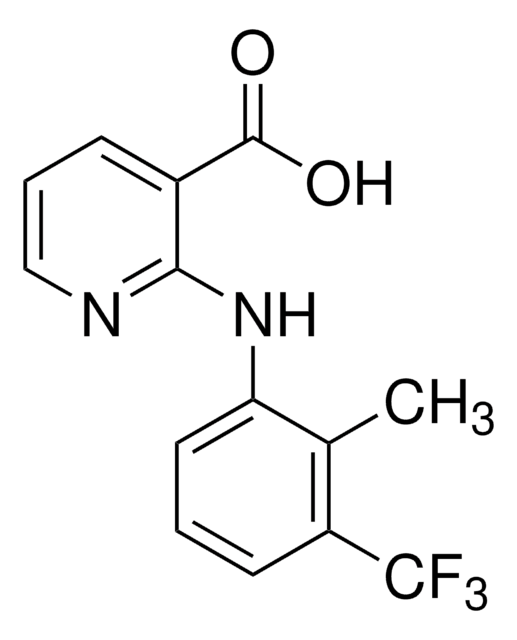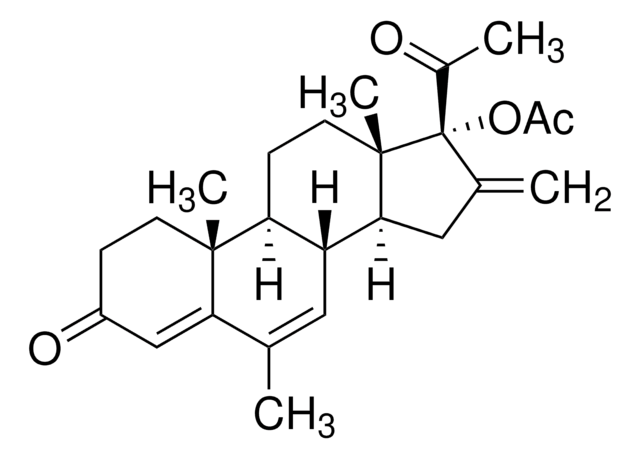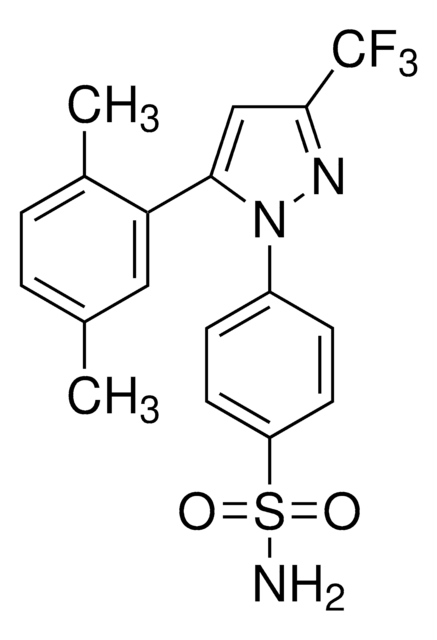N0630
Niflumic acid
Sinónimos:
2-(α,α,α-Trifluoro-m-toluidino)nicotinic acid, 2-[3-(Trifluoromethyl)anilino]nicotinic acid
About This Item
Productos recomendados
biological source
synthetic (organic)
Quality Level
assay
≥98% (HPLC)
form
powder
mp
203-204 °C
solubility
acetone: 50 mg/mL, clear to slightly hazy, yellow
SMILES string
O=C(O)C1=CC=CN=C1NC2=CC(C(F)(F)F)=CC=C2
InChI
1S/C13H9F3N2O2/c14-13(15,16)8-3-1-4-9(7-8)18-11-10(12(19)20)5-2-6-17-11/h1-7H,(H,17,18)(H,19,20)
InChI key
JZFPYUNJRRFVQU-UHFFFAOYSA-N
Gene Information
human ... PTGS1(5742)
¿Está buscando productos similares? Visita Guía de comparación de productos
Application
- as a chloride channel blocker in mouse olfactory epithelium for odor-induced electroolfactograms (EOGs) measurements, to test its analgesic effect on rat dorsal root ganglion neurons post γ-aminobutyric acid induction
- as a calcium-activated chloride channel (CaCC) inhibitor in C2C12 myoblasts and also to test its effect on volume-regulated anion channel (VRAC)
- as an inhibitor of voltage-dependent potassium channel in human embryonic kidney (HEK 293) phoenix cells
Biochem/physiol Actions
Features and Benefits
signalword
Danger
hcodes
Hazard Classifications
Acute Tox. 3 Oral - Aquatic Chronic 4
Storage Class
6.1C - Combustible acute toxic Cat.3 / toxic compounds or compounds which causing chronic effects
wgk_germany
WGK 3
ppe
dust mask type N95 (US), Eyeshields, Faceshields, Gloves
Certificados de análisis (COA)
Busque Certificados de análisis (COA) introduciendo el número de lote del producto. Los números de lote se encuentran en la etiqueta del producto después de las palabras «Lot» o «Batch»
¿Ya tiene este producto?
Encuentre la documentación para los productos que ha comprado recientemente en la Biblioteca de documentos.
Los clientes también vieron
Nuestro equipo de científicos tiene experiencia en todas las áreas de investigación: Ciencias de la vida, Ciencia de los materiales, Síntesis química, Cromatografía, Analítica y muchas otras.
Póngase en contacto con el Servicio técnico













